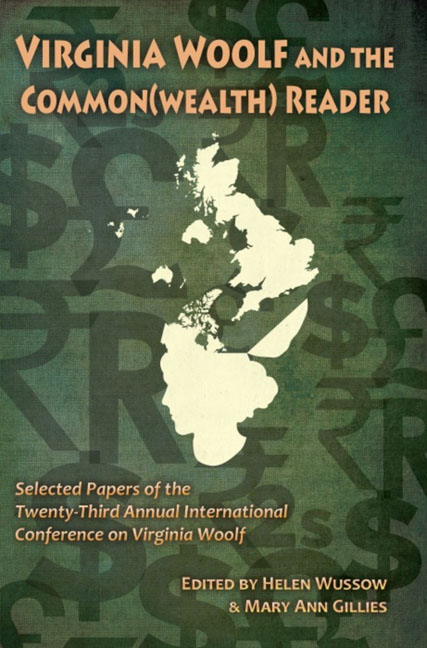Book contents
- Frontmatter
- Contents
- Introduction to Virginia Woolf and the Common(wealth) Reader
- Acknowledgments
- List of Abbreviations
- Invocations
- Networks of Affiliation: Foundations and Friends
- Woolf and the Commonwealth
- “Simplicity and art shades reign supreme”: Costume, Collectibles, and Aspiration in Katherine Mansfield's New Zealand
- Wealth in Common: Gifts, Desire, and Colonial Commodities in Woolf and Mansfield
- On a View from the Rims: Katherine Mansfield and Emily Carr
- London Calling: Una Marson in the Colonial London Scene
- Modernism Across the Commonwealth: Virginia Woolf's and Arundhati Roy's Critique of Empire
- From Bloomsbury to Fountain Lakes: An Australian Virginia Woolf
- 1930s Onwards
- Woolf Beyond the Book
- Notes on Contributors
- Conference Program
Wealth in Common: Gifts, Desire, and Colonial Commodities in Woolf and Mansfield
from Woolf and the Commonwealth
- Frontmatter
- Contents
- Introduction to Virginia Woolf and the Common(wealth) Reader
- Acknowledgments
- List of Abbreviations
- Invocations
- Networks of Affiliation: Foundations and Friends
- Woolf and the Commonwealth
- “Simplicity and art shades reign supreme”: Costume, Collectibles, and Aspiration in Katherine Mansfield's New Zealand
- Wealth in Common: Gifts, Desire, and Colonial Commodities in Woolf and Mansfield
- On a View from the Rims: Katherine Mansfield and Emily Carr
- London Calling: Una Marson in the Colonial London Scene
- Modernism Across the Commonwealth: Virginia Woolf's and Arundhati Roy's Critique of Empire
- From Bloomsbury to Fountain Lakes: An Australian Virginia Woolf
- 1930s Onwards
- Woolf Beyond the Book
- Notes on Contributors
- Conference Program
Summary
In many ways Woolf and Mansfield seem to have occupied very different cultural positions. Woolf was a member of Bloomsbury and her intellectual and cultural credentials were secure; she and other “Blooms Berries” (as Mansfield called them) referred to Mansfield and Murry as having a sense of “the underworld” about them (D1 159, 222). Mansfield, the “little colonial” (Notebooks 166), occupied a more marginal cultural position but one which, in many ways, afforded her a different critical perspective. However, in spite of these and other differences between them, both were aware of their shared goal of shaping the literary landscape in new ways, and many of their personal writings in diaries, journals and letters attest to the affinity at work in their friendship and professional roles. Critics and biographers have identified important, if sometimes unlikely, parallels and correspondences in their thinking, perspectives and aims. As Angela Smith argues so persuasively, Mansfield and Woolf “mirror each other constantly, in spite of their evident differences” (1999, 1). Their relationship was complex and shifting, and characterized by intense feelings of personal and professional envy, as well as by intimacy, generosity and a sense of being in tune with one another.
What is very apparent is that both found their relationship to be richly rewarding— their talk, as Woolf describes it, was “priceless” (D2 45), and Woolf agrees with Mansfield's view that they were “the only women at [that] moment […] with gift enough to make talk of writing interesting” (D 2 61). Gifts and ideas of a gift economy recur in their fiction and two stories, Mansfield's “A Cup of Tea” and Woolf's “Mrs. Dalloway in Bond Street,” articulate the subversive possibilities of women giving gifts to other women, but simultaneously foreground the potential dangers of the gift. Both stories were written in 1922 and published in 1923, and the tantalizing correspondences between them reaffirm Smith's insistence on the affinity Woolf and Mansfield shared. As these stories suggest, this extends to a sense of their affinity in “economic thinking” as this revolves around shifting notions of the gift and capitalist trade.
- Type
- Chapter
- Information
- Virginia Woolf and the Common(wealth) Reader , pp. 88 - 93Publisher: Liverpool University PressPrint publication year: 2014



